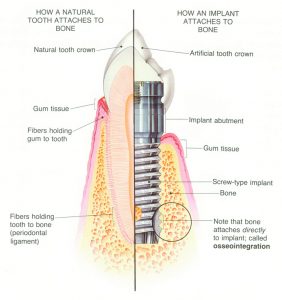By Lucia Roca, DDS, MDS, Board Certified Periodontist  Generally speaking, if you have lost teeth you are a candidate for dental implants. It is important that you are in good health, however, as there are some conditions and diseases that can affect whether dental implants are right for you. For example, uncontrolled diabetes, cancer, radiation to the jaws, smoking, alcoholism, or uncontrolled periodontal (gum) disease may affect whether dental implants will fuse to your bone. It is important to let your dental surgeon know all about your medical status (past and present) together with all medications you are taking, whether prescribed, alternative (herbal) or over-the-counter. Where and how implants are placed requires a detailed assessment of your overall stomato-gnathic system (“stoma” – mouth; “gnathic” – jaws), within which the teeth function. This will necessitate compiling records that include study models of your mouth and bite, and specialized radiographs (x-rays), which may include 3D scans known as computerized tomograms (CT scans). Planning with the help of computer imaging ensures that dental implants can be placed in exactly the right position in the bone.
Generally speaking, if you have lost teeth you are a candidate for dental implants. It is important that you are in good health, however, as there are some conditions and diseases that can affect whether dental implants are right for you. For example, uncontrolled diabetes, cancer, radiation to the jaws, smoking, alcoholism, or uncontrolled periodontal (gum) disease may affect whether dental implants will fuse to your bone. It is important to let your dental surgeon know all about your medical status (past and present) together with all medications you are taking, whether prescribed, alternative (herbal) or over-the-counter. Where and how implants are placed requires a detailed assessment of your overall stomato-gnathic system (“stoma” – mouth; “gnathic” – jaws), within which the teeth function. This will necessitate compiling records that include study models of your mouth and bite, and specialized radiographs (x-rays), which may include 3D scans known as computerized tomograms (CT scans). Planning with the help of computer imaging ensures that dental implants can be placed in exactly the right position in the bone.
How and why is bone lost when teeth are lost?
Bone needs stimulation to maintain its form and density. In the case of alveolar (sac-like) bone that surrounds and supports teeth, the necessary stimulation comes from the teeth themselves. When a tooth is lost, the lack of stimulation causes loss of alveolar bone. There is a 25% decrease in width of bone during the first year after tooth loss and an overall decrease in height over the next few years. The more teeth lost, the more function lost. This leads to some particularly serious aesthetic and functional problems, particularly in people who have lost all of their teeth. And it doesn’t stop there. After alveolar bone is lost, the bone beneath it, basal bone — the jawbone proper — also begins to resorb (melt away).
How can bone be preserved or re-grown to support dental implants?
Grafting bone into the extraction sockets at the time of tooth loss or removal can help preserve bone bone volume needed for implant placement. Surgical techniques are also available to regenerate (re-grow) bone that has been lost, to provide the necessary bone substance for anchoring implants. In fact, a primary reason to consider dental implants to replace missing teeth is the maintenance of jawbone. Bone needs stimulation to stay healthy. Because dental implants fuse to the bone, they stabilize it and prevent further bone loss. Resorption is a normal and inevitable process in which bone is lost when it is no longer supporting or connected to teeth. Only dental implants can stop this process and preserve the bone.
How are dental implants placed and who places them?
It takes a dental team to assess and plan dental implant placement and restoration — the fabrication of the crowns, bridgework or dentures that attach atop the implants and are visible in your mouth. The dental team consists of a dental surgical specialist — a periodontist, oral surgeon, or a general dentist with advanced training in implant surgery; a restorative dentist, who plans and places the tooth restorations; and a dental laboratory technician who fabricates them. Placing dental implants requires a surgical procedure in which precision channels are created in the jawbone, often using a surgical guide. The implants are then fitted into the sites so that they are in intimate contact with the bone. They generally require two to six months to fuse to the bone before they can have tooth restorations attached to them to complete the process.
At Laurel Manor Dental, they are highly trained in treating receding gingival tissue, and they take great pride in your getting you to your most advantageous dental and oral health. Laurel Manor Dental goes one step further because they have an onsite specialist in periodontal disease. Her name is Dr. Lucia Roca, and she is also certified in the Pinhole Technique. After receiving her Doctor of Dental Surgery degree, Dr. Roca spent an additional three years studying at the University of Connecticut School Of Dental Medicine. She was then accepted into the University of Medicine and Dentistry of New Jersey/Rutgers where she performed clinical research, completed her periodontics residency and earned her Masters of Dental Science degree. As a member of the American Dental Association and the American Academy of Periodontology, Dr. Roca has worked tirelessly to help bring dental care to those in need from the city streets of Newark, NJ to the rural villages of Guatemala. Her dedication and continual interest in acquiring new dental knowledge have deep ties, as Dr. Roca’s parents are both dentists, and she herself is now married to a dentist. Dr. Roca takes satisfaction in clarifying the best treatment options for her patients in English, Spanish or Italian! If you or someone you love is in need of a dental consultation for any of the issues mentioned above, or for other general dental needs or concerns, please call Laurel Manor Dental at (352) 430-1710, or visit laurelmanordental.com
Laurel Manor Dental
1950 Laurel Manor Dr. Ste. 180 B
The Villages, FL 32162
 Central Florida Health and Wellness Magazine Health and Wellness Articles of the Villages
Central Florida Health and Wellness Magazine Health and Wellness Articles of the Villages



